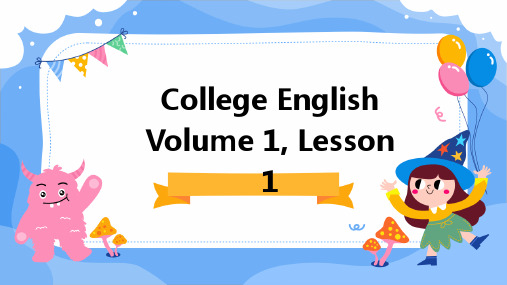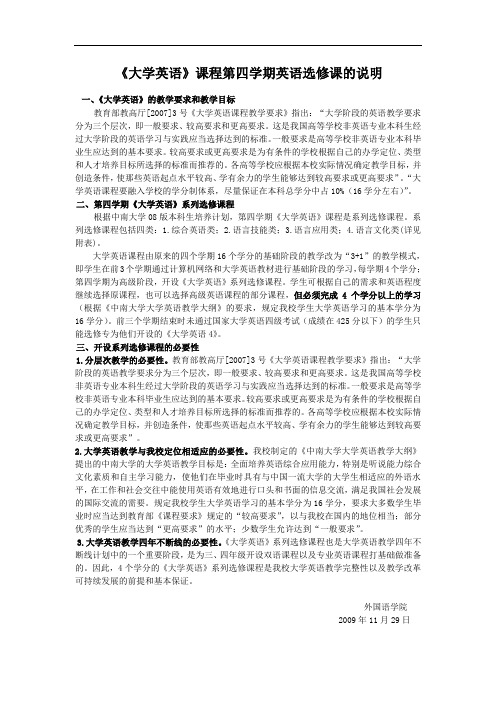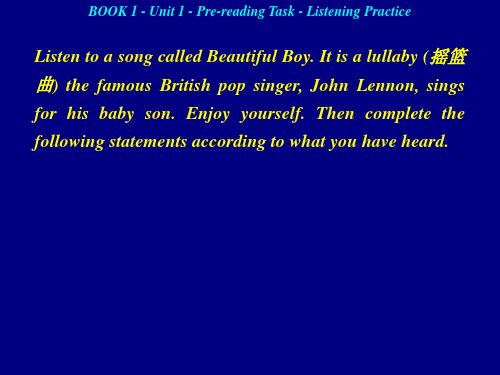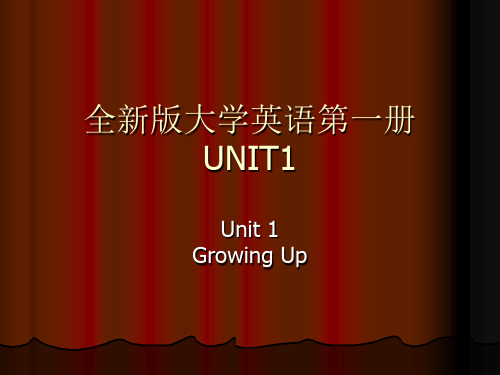大学英语教程 南京大学出版社 第一课
大学英语第一册第一课

Critical Thinking
To develop students' analytical and critical thinking skills through discussions and debates on topics related to English language and culture.
Communication Skills
To improve students' ability to communicate effectively in English, both in formal and informal settings.
Course Outline
01
Unit 1: Language and Culture
The article also highlights important grammar points,
such as parallelism, subordination, and
modality.
These sentence structures and grammar points are used to enhance readability and to ensure that the message is clear and well-
Movie and TV dialogues
选取经典的电影和电视剧片段,让学生熟悉不同场景下的对话,提高 听力反应速度。
《大学英语》课程第四学期英语选修课的说明

《大学英语》课程第四学期英语选修课的说明一、《大学英语》的教学要求和教学目标教育部教高厅[2007]3号《大学英语课程教学要求》指出:“大学阶段的英语教学要求分为三个层次,即一般要求、较高要求和更高要求。
这是我国高等学校非英语专业本科生经过大学阶段的英语学习与实践应当选择达到的标准。
一般要求是高等学校非英语专业本科毕业生应达到的基本要求。
较高要求或更高要求是为有条件的学校根据自己的办学定位、类型和人才培养目标所选择的标准而推荐的。
各高等学校应根据本校实际情况确定教学目标,并创造条件,使那些英语起点水平较高、学有余力的学生能够达到较高要求或更高要求”。
“大学英语课程要融入学校的学分制体系,尽量保证在本科总学分中占10%(16学分左右)”。
二、第四学期《大学英语》系列选修课程根据中南大学08版本科生培养计划,第四学期《大学英语》课程是系列选修课程。
系列选修课程包括四类:1.综合英语类;2.语言技能类;3.语言应用类;4.语言文化类(详见附表)。
大学英语课程由原来的四个学期16个学分的基础阶段的教学改为“3+1”的教学模式,即学生在前3个学期通过计算机网络和大学英语教材进行基础阶段的学习,每学期4个学分;第四学期为高级阶段,开设《大学英语》系列选修课程。
学生可根据自己的需求和英语程度继续选择原课程,也可以选择高级英语课程的部分课程,但必须完成4个学分以上的学习(根据《中南大学大学英语教学大纲》的要求,规定我校学生大学英语学习的基本学分为16学分)。
前三个学期结束时未通过国家大学英语四级考试(成绩在425分以下)的学生只能选修专为他们开设的《大学英语4》。
三、开设系列选修课程的必要性1.分层次教学的必要性。
教育部教高厅[2007]3号《大学英语课程教学要求》指出:“大学阶段的英语教学要求分为三个层次,即一般要求、较高要求和更高要求。
这是我国高等学校非英语专业本科生经过大学阶段的英语学习与实践应当选择达到的标准。
英语专业课程简介

外国语学院英语专业课程简介综合英语包括讲解语音、语法和词汇等方面的知识,如何综合运用这些知识进行读、听、说、写、译等语言活动。
新颖、活泼和富有趣味性。
选英语文章。
语法规则的相对有效性与语义潜在变化性之间的联系及相互制约作用。
中级阶段的惯用句型,日、德、法语的发音规律、书写方式、基本词汇、基础语法等。
方式,全方位地对学生进行翻译技巧和逻辑推理能力的训练。
本课程主要介绍英语国家(主要是英国与美国)的社会与文化概貌,如地理、历史、政治、经济、社会生活和文化传统等方面的基本知识。
与思维、语言与语境等方面的内容。
变化和分类,以及对现代英语词汇的理解和运用等问题。
本课程主要阐述英国文学发展的历史过程、民族特点和社会文化背景;英国文学的来龙去脉,各发展阶段中的重要作家的代表作品,主要作家的生平、创作生涯,代表作品的主题思想、主要情节、人物性格、写作手法等。
养学生能恰当、灵活、有创造性地把这些教学法运用到教学实践中去。
这些词所构成的复合词或与其相关的词,专有名词泛化而来的普通词,源于神话的习语。
本课程主要介绍西方文化,影视艺术的鉴赏方法。
本课程最基本的旅游常识以及在英语背景下,讲授在不同场所如何使用地道的英语语言,介绍中国旅游业的发展及中国著名景点的概况,旅游专业用语及景区专门用语。
询盘报价、索赔理赔、各种付款方式、仲裁和保险等外贸业务知识。
刊中的新闻语言及特点,进行阅读外刊的技能训练。
本课程比较系统地介绍英文写作的理论和基础技巧知识,进行为英语写作训练。
的理论依据。
读和分析美国短篇小说。
语言技巧。
文化和交际三者之间的关系;介绍各类交际形式,交际国文化,解释手势和其他形式的体态语,讨论有关文化适应和相容的问题。
进行商务谈判等。
国文学形成与发展的全貌。
讲述正确评价文学作品的标准和方法。
课程代码:090032广告文体,新闻文体,口语体,书面语体等,考察适用于不同社会情景的语言变体,如何应用文体。
等诸方面的知识,进行外语的表达能力和实践运用能力的训练。
大学英语综合教程unit1课件

much.]
12. What did Mr. Fleagle mean by saying "it's of the very essence of the essay"? [Probably he meant that the way Baker's essay was composed was exactly the way essays should be written or that the essence of a good essay is that it can move readers.]
BOOK 1 - Unit 1 - Text A - Comprehension [Mr. Fleagle was reading Mr. Baker's essay to the class. The class listened attentively, and then the entire class was laughing with openhearted enjoyment.] 11. Why did Baker feel so delighted? [Because both Mr. Fleagle and his classmates appreciated his essay very
2. The people who had been hurt in the car accident lay screaming in
[agony]. [agony]
3. Because his condition's not serious they've [put] his name [down] on
BOOK 1 - Unit 1 - Text A - Comprehension [Because he expected the topics would be dull.] 5. What was the topic that held his attention?
大学英语新生第一课ppt课件

.
.
哈佛大学曾进行过这样一项跟踪调查,对象是一群在智力、学 历和环境等方面条件差不多的年轻人。调查结果发现:27%的 人没有目标;60%的人目标模糊;10%的人有着清晰但比较短 期的目标;其余3%的人有着清晰而长远的目标.
以后的岁月,他们行进在各自的人生旅途中。25年后,哈 佛再次对这群学生进行了跟踪调查。结果是这样的:
Reading 1.Morning-reading class; 2. Student Times; 3.Other kinds of materials, magazines
Writing Write Weekly Diary using the words, phrases and Sentences that have been learned; Translation
III. Arrangement : 1 unit/2 weeks
.
V. Evaluation
Final Exam (100*60%) Everyday performance (100*40%)
45% attendance 35% quiz & homework (words dictation, composition) 20% classroom performance (notes, question answering, classroom speaking, group work report, etc.)
大学第一册英语 第一课

大学第一册英语第一课.txt老公如果你只能在活一天,我愿用我的生命来延续你的生命,你要快乐的生活在提出分手的时候请不要说还爱我。
How to Improve Your Study Habits Perhaps you are an average student with average intelligence. You do well enough in school, but you probably think you will never be a top student. This is not necessarily the case, however. You can receive better grades if you want to. Yes, even students of average intelligence can be top students without additional work. Here's how: 你也许是个智力一般的普通学生。
你在学校的学习成绩还不错,可你也许会觉得自己永远也成不了优等生。
然而实际情况未必如此。
你要是想取得更好的分数,也还是能做到的。
是的,即使中等智力水平的学生,在不增加学习负担的情况下,也能成为优等生。
其诀窍如下:1. Plan your time carefully. Make a list of your weekly tasks. Then make a schedule or chart of your time. Fill in committed time such as eating, sleeping, meetings, classes, etc. Then decide on good, regular times for studying. Be sure to set aside enough time to complete your normal reading and work assignments. Of course, studying shouldn't occupy all of the free time on the schedule. It's important to set aside time for relaxation, hobbies, and entertainment as well. This weekly schedule may not solve all of your problems, but it will make you more aware of how you spend your time. Furthermore, it will enable you to plan your activities so that you have adequate time for both work and play.1.仔细安排你的时间。
全新版大学英语综合教程第一册课件(完整版)

Expressions & Patterns
How to apply to our real life the typical expressions and patterns taken from the text
Summary
Blank filling
Exercises
All the exercises for Text A
The idea of becoming a writer had come to me off and on since my childhood in Belleville, but it wasn't until my third year in high school that the possibility took hold. Until then I'd been bored by everything associated with English courses. I found English grammar dull and difficult. I hated the assignments to turn out long, lifeless paragraphs that were agony for teachers to read and for me to write.
This title produced an extraordinary sequence of mental images. Vivid memories came flooding back of a night in Belleville when all of us were seated around the supper table — Uncle Allen, my mother, Uncle Charlie, Doris, Uncle Hal — and Aunt Pat served spaghetti for supper. Spaghetti was still a little known foreign dish in those days. Neither Doris nor I had ever eaten spaghetti, and none of the adults had enough experience to be good at it. All the good humor of Uncle Allen's house reawoke in my mind as I recalled the laughing arguments we had that night about the socially respectable method for moving spaghetti from plate to mouth. Suddenly I wanted to write about that, about the warmth and good feeling of it, but I wanted to put it down simply for my own joy, not for Mr. Fleagle. It was a moment I wanted to recapture and hold for myself. I wanted to relive the pleasure of that evening. To write it as I wanted, however, would violate all the rules of formal composition I'd learned in school, and Mr. Fleagle would surely give it a failing grade. Never mind. I would write something else for Mr. Fleagle after I had written this thing for myself. When I finished it the night was half gone and there was no time left to compose a proper, respectable essay for Mr. Fleagle. There was no choice next morning but to turn in my tale of the Belleville supper. Two days passed before Mr. Fleagle returned the graded papers, and he returned everyone's but mine. I was preparing myself for a command to report to Mr. Fleagle immediately after school for discipline when I saw him lift my paper from his desk and knock for the class's attention.
volume 1 - unit 1 大学英语基础教程1课件

5. They tried their best to let us know what they would do next. They tried their best to make clear what they would do next.
3. What are the tips for teenagers about the surfing on the Net? (be careful, never meet, never answer, never use, keep away from)
4. How could people judge whether the information on the Net is correct? (official websites, personal purpose)
5. What problems can the Net cause? (play games too much, fail exams)
Understand the Specifies
• 1. T The word " Internet " was first used in 1983.
• 2. T Google is a popular search engine. • 3. T Adult netizens may be about 60% of
• 9. I __f_ail_ed__ my driving test the first time I took it.
- 1、下载文档前请自行甄别文档内容的完整性,平台不提供额外的编辑、内容补充、找答案等附加服务。
- 2、"仅部分预览"的文档,不可在线预览部分如存在完整性等问题,可反馈申请退款(可完整预览的文档不适用该条件!)。
- 3、如文档侵犯您的权益,请联系客服反馈,我们会尽快为您处理(人工客服工作时间:9:00-18:30)。
3.How are you?是英语口语中常用的问候语,是熟人、 朋友之间打招呼后,互致问候的用语,意为“你好吗?” 或“你身体好吗?”。用How are you?问候时,对方可根 据实际情况来回答。如身体感觉良好可说: I’m fine,thank you.很好,谢谢。 I’m very well indeed,thank you.确实很好,谢谢。 I’m extremely well,thank you.很好,谢谢。 Pretty good,thank you.很好,谢谢。
祝愿以及叮嘱
I'll look forward to seeing you soon. Let's hope we’ll meet again. Hope to see you again. Drop in anytime you like. Take care of yourself, and don't forget to keep in touch. Do keep in touch! My regards to your family. A pleasant journey to you!I'll miss you!
4.Good morning,Good afternoon和Good evening均是一天中第 一次见面时的问候语,分别在上午、下午和晚饭后用。 Good morning.是上午见面时用的问候语,回答也一样。 Good afternoon.午后见面时用,回答用同样的话。 Good evening.晚上见面时用,回答用同样的话。 5.How are things with you?一切都好吗?这也是常用的问候语, 用来询问近况,类似的句子还有: How’s everything with you?一切可好? How are you doing?近来你一切都好吗? How have you been?近来好吗? How are you getting along?你好吗? How’s it going?近来可好? How are things going?近来好吗? How’s life with you?过得如何? What’s the news?近况如何? How’s everything at home?家中一切都好吗? How was your weekend?周末过得如何? Hi,there!怎么样? What’s up?近况如何?
季节。大型百货商场和购物中心提供大量商品销售 给顾客。人们不停地为自己及亲朋好友买东西。
Many people like to decorate their houses at Christmas time.They decorate the inside of the house and the outside,too.Inside,they usually decorate a Christmas tree,and the fire—place.
6. Long time no see.好久没见了。久违。 相似的表达语还有: Haven’t seen you for ages.好久没见了。久违。 Haven’t run into you for ages.好久没见了。久违。 Haven’t seen you for some time.好久没见了。久 违。 It’s bean a long time.好久没见了。久违。 7.Good to see you again.很高兴又见到你。这是 见面打招呼时的常用语,类似的语句还有: How nice to see you again.真高兴又见到你。 Pleased to meet you again.很高兴又见到你。 Small world,isn’t it?又见面了。
直接的告别话语 Good bye! (Bye bye! Bye!) See you (tomorrow)! See you later! So long! Farewell!
委婉的告别话语 I'd like to say goodbye to everyone. I'm afraid I must be going now. I'm calling to say goodbye.
notesห้องสมุดไป่ตู้
1.只要是朋友都能用的: How's everything? 一切都好? What's up? 近况如何? What's new? 有什么新鲜事? What's happening? 2.任何时后都可以用,但比较见外: How are you? 你 好吗? 3.适用于第一次见面: Nice to meet you. 很高兴见 到你。 4.适用于曾经见过,但不太熟的人: Nice to see you again. 很高兴再见到你。 5.适用于有一阵子没见面的朋友: How have you been? 你过得怎么样? 6.适用于很久没见的朋友: Long time no see. 好久 不见
“一帆风顺”或“一路顺风”
Have a good journey/trip God bless you! Safe and sound! Good Bye and Good Luck smooth sailing
Greetings问候
1.How do you do? 1、你好! 2、你好吗? 2.How are you? 3.Good morning (afternoon,evening)!
Dialogues two
A:Good morning,Mike.早上好!迈克。 B:Good morning,John.早上好!约翰。 A:How are you?.你好吗? B:Fine,thank you.And you?很好!谢 谢。你呢? A:Just fine,thank you.我也很好!谢 谢。
3、早上(下午,晚上)好! 4、你好! 4.Hello ! 5、嗨!(你好!) 5.Hi ! 6.How are you getting on? 6、你过得怎么样? 7.Good to see you again 7、很高兴又见到你。 8.What’s new? 8、有新情况吗? 9.How are things going 9、一切都好吧? 10.Long time no see. 10、好久没见面了。
Text
圣诞节
Christmas Day
Christmas Day is one of the most
important holidays in the West.It falls on December 25.However,the Christmas season lasts a much longer period of time than just Christmas Day. 在西方圣诞节是一个最重要的的节日。它在 十二月二十五日。然而,圣诞季节比圣诞节持 续更长的一段时间。
正式问候
How do you do?(初次见面通常用语) How are you?(比较熟悉的人之间用语) How are you getting along with...? (你近来...可好?) How are you doing?(您工作还顺利吧?) How is everything?(一切还好吧?) How is your vacation/ holiday(s)/ Christmas Day / weekend?(假期怎么样?)
流行口语
What's up?(近来可忙?) Hello? /Hi? What's going on?(近来可好?) How is life? How is it going? anything new? Pleased to meet you again
对以上问候的对答
1.How do you do! 2.Fine!Thank you,and you? 3.Every is fine! 4.I'm just great! 5.Very(quite)well,thank you! 6.Couldn't be better,thank you! 7.Not bad! 8.Can't complain! 9.Just so so.
First of all,people must buy a lot of things during the Christmas season.Large department stores and shopping centers offer a lot of sales to the customers.People keep buying things and presents for themselves,their relatives and friends.首先,人们一定会买很多东西在圣诞
Responding to Greetings对问候的回答
11.How do you do? 你好! 12.Fine. thank you.And you? 很好,谢谢。你呢? 13.I’m fine,too.Thanks. 我也好。谢谢。 。 14.I’m very well.Thank you. 我很好。谢谢你。 15.Hello ! 你好! 16.Hi ! 嗨! 17.Good morning (afternoon,evening)! 早上(下午,晚上) 18.Not bad.好!(还可以) 19.Nothing.没什么新情况。 20.Yeah! Long time no see.是 的。好久没见了。
Notes
1.Hi!嗨!这是和别人打招呼时的用语,相当于hello。一 般来说Hi后面跟名字,Hello后跟某先生之类的称呼。 例如: Hi,Tom.嗨,汤姆。 Hello,Mr.Carter.你好,卡特先生。 2.How do you do?你好! 这是一句表示问候的套语,一般在介绍两人认识后, 被介绍的双方都用这一套语互相问候。适用于各种身分 的人。一般伴有握手的动作。其形式上虽为疑问句,但 相当于一个感叹句。 用How do you do?问候时,其答语也为How do you do?。注意中文与英文所用的标点符号不同。英文用 “?”,中文则用“。”或“!”。
